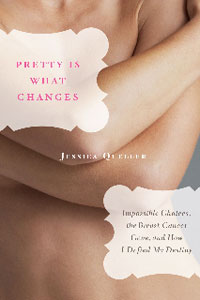
Pretty isn't beautiful, Mother.
Pretty is what changes...
What the eye arranges
is what is beautiful! - Stephen Sondheim, Sunday in the Park with George
Pretty Is What Changes is Jessica Queller's compelling memoir about self-image, self-discovery and most importantly, self-preservation. Devastated by the loss of her mother, who died of ovarian cancer after defeating breast cancer seven years earlier, Jessica was determined to do what she could to prevent the disease from ravaging her own life. A television writer for teen dramas like Gossip Girl and Gilmore Girls, Jessica is fortunate to be part of a generation when scientific advances pose difficult and highly personal medical decisions. Hers is the story of a woman forced to confront and redefine deeply rooted notions of beauty and the decision to reshape her body through preventive double mastectomy surgery so it would no longer threaten to kill her. "My mother raised me and my sister to believe being 'pretty' was the most important thing. She saw us as an extension of herself. We were pretty because we had her genes."

But with her mother's "pretty" genes also came a potentially deadly one. After her mother died, Jessica was tested for the BRCA breast-cancer gene at age 34 and learned that she had an 87 percent lifetime chance of developing breast cancer and a 44 percent lifetime chance of getting ovarian cancer. Jessica didn't react immediately because she was fit, healthy and her mother wasn't diagnosed with cancer until she was 52. However, as Jessica began to research the BRCA gene for an Op-Ed piece for the New York Times her "false sense of safety was dashed." Armed with statistics, jolted by a sudden sense of urgency and bolstered by an outpouring of support from readers of her story including her father, a medical malpractice attorney, ultimately Jessica made the decision to undergo a bilateral prophylactic mastectomy as a 35-year old, single, heterosexual woman with no obvious male life partners on the horizon.
Jessica struggled through a childhood where the emphasis on beauty was placed in high regard by her fashion designer mother. "I was raised to be a helpless princess named Tiffany," explains the now fiercely independent and hilarious television writer, who still can't bear to say her birth name. Inspired by a visit to a friend in Martha's Vineyard who happened to be playing Jessica in Shakespeare's The Merchant of Venice, the author changed her name to one that was "simple, pleasant, easily adaptable to who I was and who I would become."
She grappled with what "pretty" meant in the world of movies and television, and Jessica, as a former theater actor herself, needed to find her own definition of beauty and decide if the cost to maintain it was worth risking her life. She began to look at beauty in ways separate from her mother. "I learned that prettiness--being pretty--is an ephemeral thing. True beauty is something much more profound. It's internal. It's external. It's the soul. It's integrity. It's who you are as a human being in the world-- True beauty is being comfortable with yourself, the sum of your parts."
After coming to terms with her newfound definition of beauty, Jessica had her surgery, removing her breasts and opting not only for reconstruction, but to decrease her cup size.
But the prophylactic mastectomy is only half her battle. Within the next two years, she will undergo an oopherectomy (a removal of her ovaries) in order to decrease her 44 percent risk of ovarian cancer. But before she does, this 38-year-old single woman wants to fulfill her dreams of motherhood. "I must, somehow, some way, get pregnant and have a baby in the coming year, and then I will immediately have my ovaries removed." She continues, "my mother was not very maternal and I have ALWAYS been incredibly maternal -- that is not something inherited. In fact, I think my desire to nurture children was a reaction against my mother. I've always yearned to nurture others in the way I wish I'd been nurtured. I guess my mother learned these life lessons through her illness, near the end of her life. All of her artifice and materialism finally fell away. She grew genuinely maternal -- which was heartbreaking because just as she became the mother I'd always yearned for, I lost her."
Jessica's memoir, published by Spiegel and Grau, is a stirring reminder that one in eight women will be diagnosed with breast cancer - and of those women, five to ten percent have a genetic mutation. Jessica shows us, in her commitment to break the cycle of breast (and later ovarian) cancer, that it's possible to reap the power of modern medicine without sacrificing beauty. She's set the stage and looks toward the next generation with humility and courage.